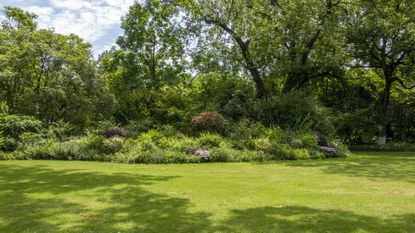

Learning how to kill weeds in your lawn according to the pros will help you settle on the most suited and convenient option for you, all the while knowing all four are effective.
In this guide, our lawn care experts delve into the four ways you can kill or remove weeds from your lawn, including tips on manual, chemical, and preventative measures.
Whether you choose one of our tried and tested best weed killers, or dig out your gardening gloves to banish weeds and beautify your lawn, the choice is yours.
How to kill weeds in your lawn in four easy steps
Avoiding lawn mowing mistakes will reduce the opportunity for weeds to set up shop in the first place. But, if these pesky, hardy, and unwanted plants have reared their heads, our experts have advised on the options available to you for killing them and banishing them for good.
Where our experts have suggested products, we have curated highly-rated matching picks from trusted retailers to help you spruce your lawn right up.
All prices were correct at the time of publication.
1. Manual removal
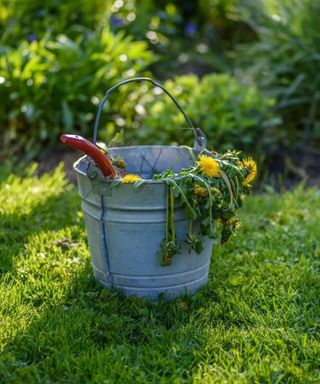
Get your kneepads and gloves ready — it's time to head outside and start digging. This option is pretty straight forward but will require time, elbow grease and perseverance. You might also benefit from a couple of specific tools.
Steve Sylva, of premier landscaping company, Steve’s Services, says, "For manual weed removal, pulling weeds after a rain shower is exceptionally effective since the soil is softer, making root extraction easier."
He continues, "Tools like a hand weeder or a garden fork can expedite the process. Consistent weeding every two weeks ensures that new weeds do not get a chance to establish deeply rooted systems."
We recommend the 4.7 star rated Fiskars Garden Weeder on Amazon, which has seen 10,000 units sold in the last month alone, is made from durable and rust-resistant materials, and comes loaded with an ergonomic grip to reduce blistering and discomfort.
Pavel Khaykin, of Pavel Buys Houses adds that the frequency you pull weeds up will vary. "It's generally recommended to pull weeds as soon as you spot them to prevent them from spreading. Keep an eye out for aggressive weeds that can quickly take over, such as bindweed or quackgrass."
Ryan Farley, CEO of LawnStarter explains that weeds are opportunistic and whilst they can grow in most places. they often prefer fertile, moist locations.
He says, "You'll still find certain weeds in dry areas too. Like regular plants, they can also be annuals, biennials, and perennials. This impacts how often they reproduce and how easily they can be managed. Annual weeds are the most common. They sprout, grow, flower, spread seeds, and die in less than 12 months."
This includes weeds like crabgrass, goosegrass, and ragweed. Luckily, they are the easiest type to get rid of due to their shallow roots.
Ryan adds, "You just have to learn their life cycle, and you can prevent or treat them effectively."
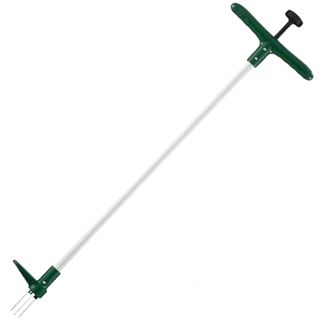
Price: Was $35.99, now $29.99
If your knees and back ache like mine do, don't squat or bend over to de-weed your lawn. Instead, use a long-armed weeder tool such as this one to do the job whilst you're on your feet. The spiky end is effective on many different weeds including dandelions, whilst the long handle allows you to have a good grip during the task to stop you slipping. It's made from durable stainless steel, which is one of the best outdoor materials you can buy, has rust-resistance, and is strong. Spend once on this budget-friendly item and it'll serve you for years to come.
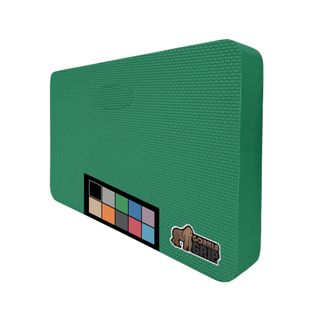
Price: Was $33.29, now $20.99
Dimensions (in.): 17.5 x 11 x 1.5
This Gorilla Grip Extra Thick Kneeling Pad offers comfort without slippage when gardening and alleviates joint aches during lengthy gardening tasks. Reviews say its positive effects can be felt not only in the knees, but the lower back too, with one customer claiming, "I'd give it 10 stars if I could." With 21,500 reviews and an average 4.6/5 stars given by happy customers, thousands of keen gardeners approve of this purchase.

Prices: From $9.99 (pack of two) to $21.49 (pack of 10)
Sizes: Small, medium, and large
Lightweight and created with a sturdy foamed latex coating, COOLJOB Gardening Gloves are a hit when planting. Expect an excellent grip, a stretchy base, and cute colors to boot. I particularly like that these items were made with chemicals that are safer for humans and the environment as certified by OEKO-TEX STANDARD 100.
2. Herbicides
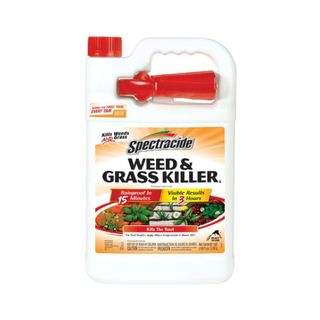
You can let chemicals designed for the job do the majority of the heavy lifting for you by employing a broadleaf weed killer that will target most common weeds and kill them off at the root over the course of a week or two. This will protect your grass and target only weeds.
Steve says, "When it comes to chemical solutions, I highly recommend using Spectracide Weed Stop For Lawns, which is available at Walmart. It targets broadleaf weeds without harming your grass if used precisely according to instructions."
"Apply this in early mornings or late evenings when wind conditions are calm to avoid drift. Usually, repeating the application every four to six weeks can help tackle stubborn weeds," he adds.
Once you've had a blast of this and waited the appropriate time as per the manufacturer's instructions, you can scope out which weeds have survived and either pull them out manually, or find a product specific to kill that type of weed.
You might find this process needs to be repeated annually as seeds from your weeds may have dispersed before your treatment or removal, resulting in new plants down the line. Consistency in application is key to eradicating weeds over the longer term.
Kenny Kwiatkowski, the creator of the GRASSHOLE System, adds, "Pre-emergent herbicides like corn gluten meal are great for preventing weed seeds from germinating. Timing is critical with this method — apply it early in the growing season before weeds begin to sprout. This natural approach not only prevents weeds but also enriches the soil with nitrogen."
Try a bag of Preen Natural Vegetable Garden Weed Preventer from Lowe's, made from 100% corn meal gluten, and sprinkle it around your lawn, fruit and vegetable patches every four to six weeks for best results. It's worth knowing it's been rated five stars by happy customers.
The other option is using a granular feed.
Bryan Clayton, CEO of Your GreenPal explains, "Granular weed and feed is granular fertilizer that is coated with weed killer. You want to apply it to a wet yard so the weed killer sticks to the foliage. Granular weed and feed (such as the Scotts Turf Builder Weed & Feed3 on Amazon covers 5000 square feet and has 30,000+ reviews and an average of 4.3 stars) has a two-in-one effect and it works great if apply correctly."
The key to effective application, Bryan says, is not tossing it out any old time. "You have to do it early in the morning when there’s dew on the grass," he says. "That moisture helps the granules stick to the weed leaves, which then absorbs the chemical and knocks them dead."
If you want to give a liquid pre-emergent herbicide a go, Ryan says it can work much more quickly and be applied more precisely.
He says, "You can usually use smaller quantities because of that precision. Granular types, on the other hand, are usually less expensive and are pretty easy to spread. Overall, I prefer liquid. You want to make sure to look for one that is specifically designed for your grass type."
If you don’t pay attention to the which grass type it's for, the herbicide can cause significant damage to your lawn.
3. Maintain your lawn
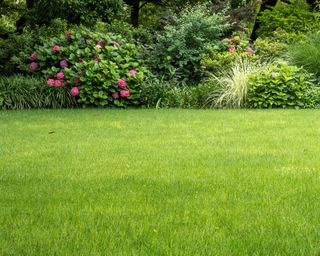
Weeds are opportunistic plants that will take advantage of patchy, dying lawn or areas suffering scalping (when the grass has been cut too low), as well as lawn fungus. One way of getting rid of weeds is taking away the opportunity for its seeds to land and grow.
Seed patches of lawn that have lost grass volume or coverage so new grass grows instead of weeds,or replace empty patches with new healthy turf. In the meantime, deal with the reason your lawn is dying off by getting clued up on lawn mowing mistakes.
Kenny explains, "Regular lawn care practices such as aeration and overseeding are also essential. Aeration allows water, air, and nutrients to reach the roots more effectively, promoting a healthy lawn that’s more resilient to weeds. Overseeding helps fill in thin spots, creating a thicker lawn that leaves little room for weeds to establish."
Mowing the grass in extreme heat or cutting it more than a third of its height at a time can damage it, leaving the area open to weeds.
4. Other solutions
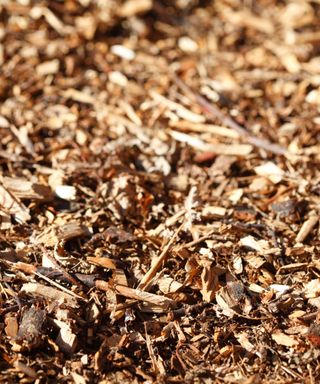
Matthew Wilson, gardening expert at handygardeners.com says, "Some of the most effective methods of controlling weeds involve using physical techniques."
He recommends trying:
- Mulching: Place heavy layers of organic material such as grass or straw on flower beds and garden areas to prevent weeds from getting any sunlight. The mulch should not be placed directly on the stems or roots of the plants to avoid rotting.
- Material: Use wood chips or straw as organic mulch since it is environmental friendly and promotes the growth of soil micro organisms.
- Thickness: Spread 2-3 inches of mulch over the surface of the beds and surrounding areas.
A natural solution to your woes may be vinegar. Ryan explains, "Vinegar is the only weed killer I use at home. While we'll often spray weed killer, fertilizer, and pesticides on our clients' lawns, it's something I try to stay away from as much as possible."
Instead, he relies on pulling weeds by hand and a mixture of vinegar, salt, and water for those stubborn weeds that just keep coming back. "Simply put the mixture in a spray bottle and spray it directly on the plant you want to get rid of," he explains.
Meet our experts

With over 25 years of experience, Steve Sylva is the owner of Steve’s Services, a premier landscape company based in Malden, MA. Originally founded in 1995 as Steve's Lawn Care Services, the company specializes in landscape maintenance, installation, and hardscaping services for clients in Everett, MA, and surrounding areas.

Pavel specializes in creating custom solutions for homeowners to help solve the problems and challenges they are facing, including interior and outdoor home problems.

Former veteran Kenny is the CEO and ownder of the GRASSHOLE System. This is a low cost, patent pending, long term solution to sprinkler head damage and alignment problems, and an expert in lawn care solutions.

Bryan has been in the lawn care industry his entire career, starting with mowing neighbor’s lawns in high school to the successful acquisition of Peach Tree in 2013 to Landscapes USA, a national provider of commercial landscape services. The inspiration for GreenPal was born of the frustration Bryan observed while operating the landscape business, and how difficult it is for homeowners to find, schedule, and pay a reliable small lawn care professional.

Matthew Wilson, CEO of Handy Gardeners, leads the company with a passion for landscaping and environmental sustainability. Under his guidance, Handy Gardeners has become a trusted name in the industry, providing top-notch gardening and landscaping services. As a seasoned professional in the field of lawn care and horticulture, Matthew understands the frustration that weeds can bring to maintaining a beautiful and healthy lawn and gives clients comprehensive methods for tackling weeds, including manual, chemical, and preventative measures, along with expert tips and product recommendations.

Ryan Farley, CEO of LawnStarter, helps Americans find and book quality lawn services in their area.
To get ahead of the weed seeds that are laying in wait for a bare patch of lawn to sprout up from, learn when to start mowing a lawn in spring, summer lawn care tips, and how to scarify a lawn.
Join our newsletter
Get the best home decor ideas, DIY advice and project inspiration straight to your inbox!

Hi! I'm editor of Real Homes. I've been a senior journalist and editor for national magazines and newspapers for 16 years, specializing in consumer, real-life, and lifestyle articles. I have a BA in English Language and Communication, mentor journalists, and I’m also founding editor of Lacuna Voices, an independent digital platform. I love to cook, add character to my newly-built home, try my hand at DIY projects, keep my collection of plants alive, and make memories with my little family of three. For Real Homes, I specialize in articles on pest control, DIY, declutterring and cleaning, interviewing experts daily for their top tips and product recommendations.